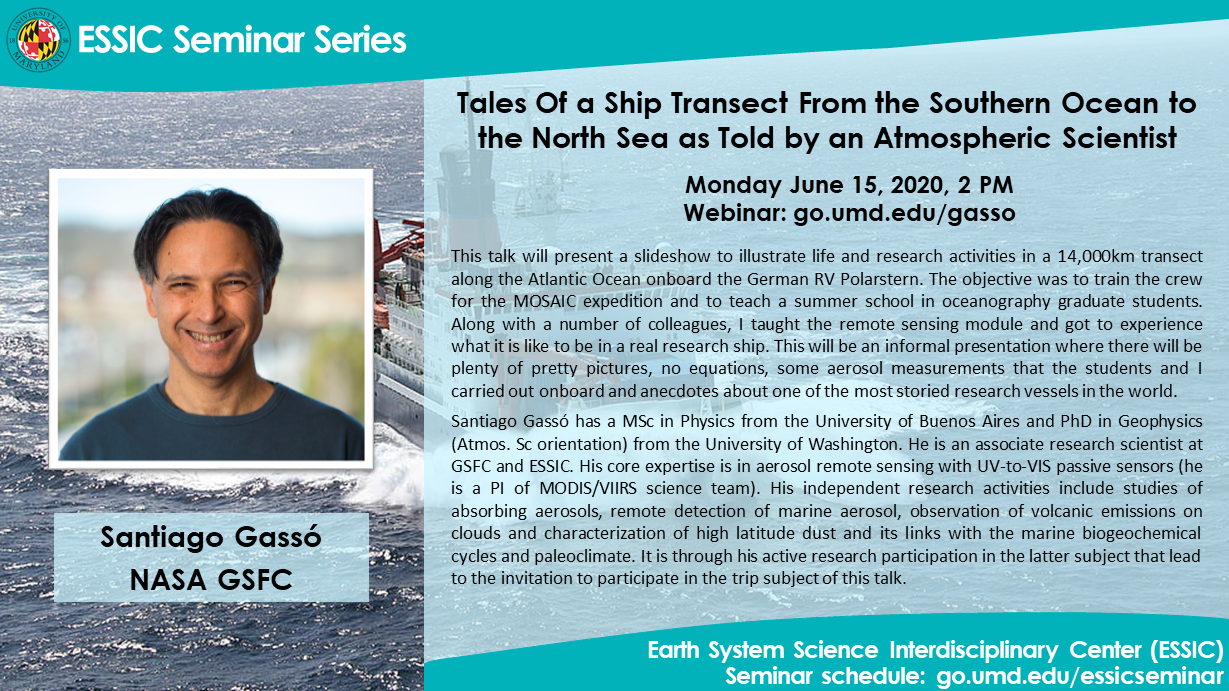
Tales of a Ship Transect From the Southern Ocean to the North Sea as Told by an Atmospheric Scientist
This event has passed. See the seminar recording here:
Santiago Gassó
NASA GSFC
Monday June 15, 2020, 2 PM
Webinar: go.umd.edu/gassowebinar
Abstract:
Last year, a colleague whom I have not seen for more than 10 years (and probably have only exchanged a handful of emails with) invited me to participate as a remote sensing instructor for oceanography students during a summer short course. The venue was onboard the world-renowned icebreaker Polarstern. The storied Polarstern has been the German insignia R/V for polar studies and just finished its deployment to the MOSAIC expedition in the Arctic. This out-of-the-blue invitation was quickly accepted and six months later, I landed at the port of Punta Arenas (Chile) where I met the crew and began a +14,000km trip from the cold South Atlantic to the summer in Northern Germany. This presentation will be an informal slideshow to illustrate life and research activities, there will be plenty of pretty pictures, no equations, some aerosol measurements that the students and I carried out onboard and anecdotes about one of the most storied research vessels in the world. For more information about the Polarstern’s MOSAIC expedition, visit the website: https://mosaic-expedition.org/
Bio-sketch:
Dr. Santiago Gassó specializes in observational studies of aerosols, clouds and their interactions using a combination of satellite detectors. He has extensive knowledge of the aerosol retrieval algorithms of the detectors MODIS and OMI and their performance.
He is a University of Washington graduate in geophysics (Atmospheric Science track) with thesis work on in-situ (aircraft) observations of aerosols, their optical properties in relation to remote sensing and evaluation of the first versions of the MODIS aerosol algorithm. In his post-doctoral work, he acquired aerosol global modeling experience with the design of a (currently operational) module of the optical and radiative aerosol properties in the Navy Aerosol Assimilation Prediction System (NAAPS) model. Also, he has participated as aerosol scientist in the NPOESS Preparatory Project science team (2005-08). Since 2008, he is an Ozone Monitoring Instrument (OMI) science team and a member of the OMI aerosol remote sensing group led by Dr. Omar Torres. During 2009 to 2011, he led the Aerosol-Ocean Interactions working group, one of the science working groups for the Aerosol, Clouds and Ecosystems (ACE) mission, a proposed NASA mission to fulfill the NRC Decadal Survey requirements. More recently (2018), he rejoined the S-NPP science team as PI scientist and he is working on the development of aerosol retrievals using a combination of near ultraviolet (OMPS-NM sensor) and visible (VIIRS sensor) observations.
In addition to the operational aspects of remote sensing retrievals, his research interests include study of dust at high latitudes. In particular, characterization of its production and long range transport as well as its impacts in biogeochemical and paleo-climate studies. He has carried out for the last 15 years this activity. He has been a collaborator and Co-I in internationally funded projects to survey and monitor dust activity in Patagonia. He made the first dedicated satellite and model studies of dust activity in Patagonia. In 2007, he chaired and organized the Multidisciplinary Workshop on Southern South American Dust held in Puerto Madryn, Argentina, 2007 for which obtained NSF funding and had an attendance 60 participant (~20 international). Between 2010 and 2013, he participated as co-I in a NASA-IDS funded project to characterize dust transport from Alaska glaciers and has been monitoring the area with remote sensing tools since then. During the period 2014-2017, he was part of the High Latitude Dust and Cold Environment Network, a working group supported by The Leverhulme Trust (UK). He has authored or co-authored peer-reviewed journal articles many on the subject of dust transport at high latitudes as characterized by satellite, model and surface observations.
He also developed an interest in studying volcanoes through a discovery he made in 2006. He found that low levels volcanic activity (non-explosive passive degassing activity VEI<2) can be detected in cloudy conditions by studying the change in properties in nearby water clouds. The discovery provides an excellent opportunity for studying aerosol-cloud interactions as well as provides a way to detect volcanic activity in cloudy conditions.
Additional outreach and networking activates include the participation in the Science Steering Committee of SOLAS (Surface-Ocean Lower Atmosphere Study). SOLAS is an organization dedicated to the promotion, coordination and training of scientists on subjects related to aerosol, gas and cloud exchanges at the marine interface and how these systems interact with each other.
While not currently with a recurrent teaching activity, he has a diverse instructional experience after having taught at undergraduate and graduate level through the years. This included mentoring summer interns, thesis co-adviser as well as invited lecturer of small courses. His most recent teaching activity was carried out during June/2019 when he was invited by the Alfred Wegener Institute(Germany) to a remote sensing instructor onboard of the ice-breaker Polarstern during their oceanographic summer school.
See the ranking of publications: http://www.researcherid.com/rid/H-9571-2014
He regularly posts about his current research and other aspect of aerosol remote sensing. Follow him at Twitter: @SanGasso
ORCID : http://orcid.org/0000-0002-6872-0018
Webinar info:
Event site: https://go.umd.edu/gasso
Event number: 160 246 1728
Event password: essic
——————————————————-
To join the online event
——————————————————-
1. Click here to join the online event.
2. Click “Join Now”.
——————————————————-
To join the audio conference only
——————————————————-
US Toll: +1-415-655-0002
Global call-in numbers
Access code: 160 246 1728
——————————————————-
For IT assistance
——————————————————-
Cazzy Medley: cazzy@umd.edu
Travis Swaim: tswaim1@umd.edu

